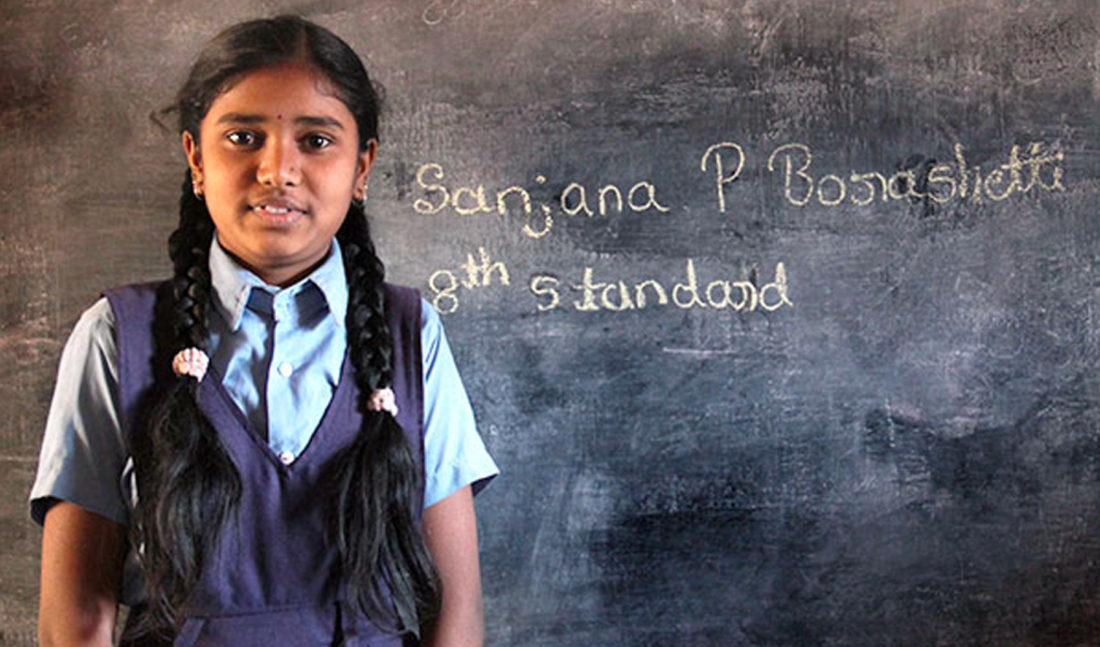"Globally, close to 1.1 billion people lack access to electricity and 300 million of this deprived lot live in India, by far the highest share of any single country." (CEEW Report, 2015)
It’s just another day for her; she reaches school around 9 am, completes any pending homework, attends the morning assembly and gets on with Std VIII classes for the rest of her day.
Sanjana Borashetti, with two neatly tied plaits, is a school topper and is the go-to person for her classmates. In love with literature, especially poems, Sanjana has her own collection of poems written in Kannada in a class workbook. After school, she heads home which shelters seven people under the same roof; a home that has grown accustomed to living without electricity.
‘On living without electricity’
Until four years ago, everything was normal in this household. However, it took a different direction when her father could not repay a few loans and owing to mounting bills, the house lost its power supply. Four years on, the house continues to live without the basic need.
Sanjana’s father is a milkman and mother works as a domestic help. While her parents get busy in the morning, she starts her day with a prayer. At times, she helps mother fetch water from a nearby well (the family needs at least 10 to 15 pots of water every day), cleans the house, and helps her brother with his homework.
At school, she supervises many activities such as assembly, attendance and news (relevant current affairs are announced every day). Being the class monitor for a total of 36 students, she shares a good rapport with her classmates and ensures everyone is aware of upcoming activities in school.
Sanjana and her classmates play with a skipping rope.
If not electricity, there is a lot of hope for the family. In order to study and complete her homework, Sanjana uses a torch. "There are two torches at home. I use one while studying," she says. Although they do not have access to electricity, the young girl excels in studies.
‘I want to put an end to bribes’
To live without a few basic necessities can be a challenge. But a few get on without perceiving it as a hindrance. For Sanjana, television is a forgotten tool and lack of electricity is no reason to complain. With all the support that she gets from her teachers, she has been performing well in her academics and is also sure of her interests. "When I grow up, I want to become a DC," she says. District Collector (DC) is one of the most competitive jobs in India and Sanjana wants to take up this role to put an end to bribes.
‘Her school is her support system’
Government Higher Primary School, located in Bairidevara Koppa, Hubballi, is well maintained, clean, and the students are enthusiastic. A section of this school was built under the ‘Freedom through Education’ project led by Round Table India.
For Sanjana, being in school amongst her classmates means everything. Be it studying or spending free time, she prefers school environment. During her lunch provided by Akshaya Patra, she gets to eat freshly cooked food; Rice and Sambar, and Pulao are her favourites. Back at home, food is prepared on an earthen stove using firewood.
When there’s time, Sanjana writes poems (she learnt poetry in a summer camp a year ago), collects favourite quotes from books and also collects information that would improve her knowledge. Books are her best company and she is grateful for the education she is currently receiving.
13-year-old Sanjana is one among the many students in India looking forward to fulfilling her dreams and The Akshaya Patra Foundation wishes her the best.

